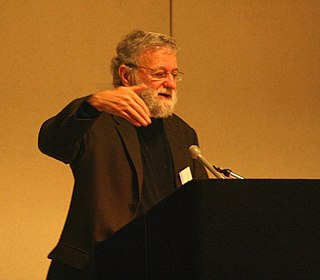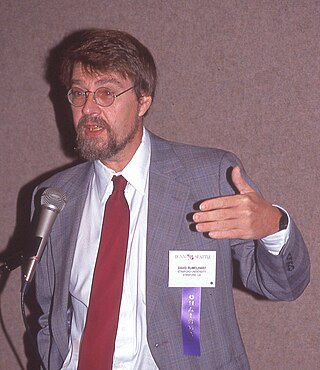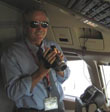
Cognitive science is the interdisciplinary, scientific study of the mind and its processes. It examines the nature, the tasks, and the functions of cognition. Mental faculties of concern to cognitive scientists include perception, memory, attention, reasoning, language, and emotion; to understand these faculties, cognitive scientists borrow from fields such as psychology, artificial intelligence, philosophy, neuroscience, linguistics and anthropology. The typical analysis of cognitive science spans many levels of organization, from learning and decision-making to logic and planning; from neural circuitry to modular brain organization. One of the fundamental concepts of cognitive science is that "thinking can best be understood in terms of representational structures in the mind and computational procedures that operate on those structures."

Donald Arthur Norman is an American researcher, professor, and author. Norman is the director of The Design Lab at University of California, San Diego. He is best known for his books on design, especially The Design of Everyday Things. He is widely regarded for his expertise in the fields of design, usability engineering, and cognitive science, and has shaped the development of the field of cognitive systems engineering. He is a co-founder of the Nielsen Norman Group, along with Jakob Nielsen. He is also an IDEO fellow and a member of the Board of Trustees of IIT Institute of Design in Chicago. He also holds the title of Professor Emeritus of Cognitive Science at the University of California, San Diego. Norman is an active Distinguished Visiting Professor at the Korea Advanced Institute of Science and Technology (KAIST), where he spends two months a year teaching.
A cognitive model is a representation of one or more cognitive processes in humans or other animals for the purposes of comprehension and prediction. There are many types of cognitive models, and they can range from box-and-arrow diagrams to a set of equations to software programs that interact with the same tools that humans use to complete tasks. In terms of information processing, cognitive modeling is modeling of human perception, reasoning, memory and action.
Distributed cognition is an approach to cognitive science research that was developed by cognitive anthropologist Edwin Hutchins during the 1990s.

The Iwo Jima-class amphibious assault ships of the United States Navy were the first amphibious assault ships designed and built as dedicated helicopter carriers, capable of operating up to 20 helicopters to carry up to 1,800 marines ashore. They were named for battles featuring the United States Marine Corps, starting with the Battle of Iwo Jima. The first ship of the class was commissioned in 1961, and the last was decommissioned in 2002. The hull classification of "LPH" stands for "Landing Platform Helicopter".

David Kirsh is a Canadian cognitive scientist. He is a professor of cognitive science at the University of California, San Diego (UCSD), where he heads the Interactive Cognition Lab. From 2020-2023 he was the President of the Academy of Neuroscience for Architecture (ANFA), where he remains on the Board of Directors.
Andrea A. diSessa is an education researcher and author of the book Turtle Geometry about Logo. He has also written highly cited research papers on the epistemology of physics, educational experimentation, and constructivist analysis of knowledge. He also created, with Hal Abelson, the Boxer Programming Environment at the Massachusetts Institute of Technology.

David Everett Rumelhart was an American psychologist who made many contributions to the formal analysis of human cognition, working primarily within the frameworks of mathematical psychology, symbolic artificial intelligence, and parallel distributed processing. He also admired formal linguistic approaches to cognition, and explored the possibility of formulating a formal grammar to capture the structure of stories.
Cognitive ergonomics is a scientific discipline that studies, evaluates, and designs tasks, jobs, products, environments and systems and how they interact with humans and their cognitive abilities. It is defined by the International Ergonomics Association as "concerned with mental processes, such as perception, memory, reasoning, and motor response, as they affect interactions among humans and other elements of a system. Cognitive ergonomics is responsible for how work is done in the mind, meaning, the quality of work is dependent on the persons understanding of situations. Situations could include the goals, means, and constraints of work. The relevant topics include mental workload, decision-making, skilled performance, human-computer interaction, human reliability, work stress and training as these may relate to human-system design." Cognitive ergonomics studies cognition in work and operational settings, in order to optimize human well-being and system performance. It is a subset of the larger field of human factors and ergonomics.
Group cognition is a social, largely linguistic phenomenon whereby a group of people produce a sequence of utterances that performs a cognitive act. That is, if a similar sequence was uttered or thought by an individual it would be considered an act of cognition or thinking. The group can be a small group, such as 3–5 people talking together or working together online. The group can also be a larger collective, such as a classroom of students or a global community contributing asynchronously to an extended discourse on a problem or topic or to a knowledge repository like Wikipedia. The theory of group cognition is a postcognitivism philosophy, which considers a larger unit of analysis than an individual mind as a producer of cognitive activities such as creative problem solving.

Lucy Suchman is Professor Emerita of Anthropology of Science and Technology in the Department of Sociology at Lancaster University, in the United Kingdom, also known for her work at Xerox PARC in the 1980s and 90s.
James D. Hollan is professor of cognitive science and adjunct professor of computer science at the University of California, San Diego. In collaboration with Professor Edwin Hutchins, he directs the Distributed Cognition and Human–Computer Interaction Laboratory at UCSD, and co-directs the Design Lab. Hollan has also spent time working at Xerox PARC and at Bellcore. He was elected to the CHI Academy in 2003 and received the ACM SIGCHI Lifetime Research Award in 2015.

Paul Dourish is a computer scientist best known for his work and research at the intersection of computer science and social science. Born in Scotland, he holds the Steckler Endowed Chair of Information and Computer Science at the University of California, Irvine, where he joined the faculty in 2000, and where he directs the Steckler Center for Responsible, Ethical, and Accessible Technology. He is a Fellow of the AAAS, the ACM, and the BCS, and is a two-time winner of the ACM CSCW "Lasting Impact" award, in 2016 and 2021.
Psychological anthropology is an interdisciplinary subfield of anthropology that studies the interaction of cultural and mental processes. This subfield tends to focus on ways in which humans' development and enculturation within a particular cultural group—with its own history, language, practices, and conceptual categories—shape processes of human cognition, emotion, perception, motivation, and mental health. It also examines how the understanding of cognition, emotion, motivation, and similar psychological processes inform or constrain our models of cultural and social processes. Each school within psychological anthropology has its own approach.
Dylan Schmorrow is an American scientist and retired United States Defense Official. He is currently the chief scientist at Soar Technology, Inc.. He is a retired US Navy captain, and served as the deputy director of the Human Performance, Training, and BioSystems Research Directorate at the Office of the Assistant Secretary of Defense, Research & Engineering at Office of the Secretary of Defense. He was also specialty leader of the Aerospace Experimental Psychologist community and an acquisition professional in the Naval Acquisition Corps.
The LIDA cognitive architecture, previously Learning Intelligent Distribution Agent for its origins in IDA, attempts to model a broad spectrum of cognition in biological systems, from low-level perception/action to high-level reasoning. Developed primarily by Stan Franklin and colleagues at the University of Memphis, the LIDA architecture is empirically grounded in cognitive science and cognitive neuroscience. It is an extension of IDA, which adds mechanisms for learning. In addition to providing hypotheses to guide further research, the architecture can support control structures for software agents and robots. Providing plausible explanations for many cognitive processes, the LIDA conceptual model is also intended as a tool with which to think about how minds work.
Joshua Brett Tenenbaum is Professor of Computational Cognitive Science at the Massachusetts Institute of Technology. He is known for contributions to mathematical psychology and Bayesian cognitive science. According to the MacArthur Foundation, which named him a MacArthur Fellow in 2019, "Tenenbaum is one of the first to develop and apply probabilistic and statistical modeling to the study of human learning, reasoning, and perception, and to show how these models can explain a fundamental challenge of cognition: how our minds understand so much from so little, so quickly."
Distributed leadership is a conceptual and analytical approach to understanding how the work of leadership takes place among the people and in context of a complex organization. Though developed and primarily used in education research, it has since been applied to other domains, including business and even tourism. Rather than focus on characteristics of the individual leader or features of the situation, distributed leadership foregrounds how actors engage in tasks that are "stretched" or distributed across the organization. With theoretical foundations in activity theory and distributed cognition, understanding leadership from a distributed perspective means seeing leadership activities as a situated and social process at the intersection of leaders, followers, and the situation.
Cognitive ecology is the study of cognitive phenomena within social and natural contexts. It is an integrative perspective drawing from aspects of ecological psychology, cognitive science, evolutionary ecology and anthropology. Notions of domain-specific modules in the brain and the cognitive biases they create are central to understanding the enacted nature of cognition within a cognitive ecological framework. This means that cognitive mechanisms not only shape the characteristics of thought, but they dictate the success of culturally transmitted ideas. Because culturally transmitted concepts can often inform ecological decision-making behaviors, group-level trends in cognition are hypothesized to address ecologically relevant challenges.
Cognitive systems engineering (CSE) is a field of study that examines the intersection of people, work, and technology, with a focus on safety-critical systems. The central tenet of cognitive systems engineering is to treat a collection of people and technology as a single unit, one that is capable of performing cognitive work. This unit is referred to as a joint cognitive system.







